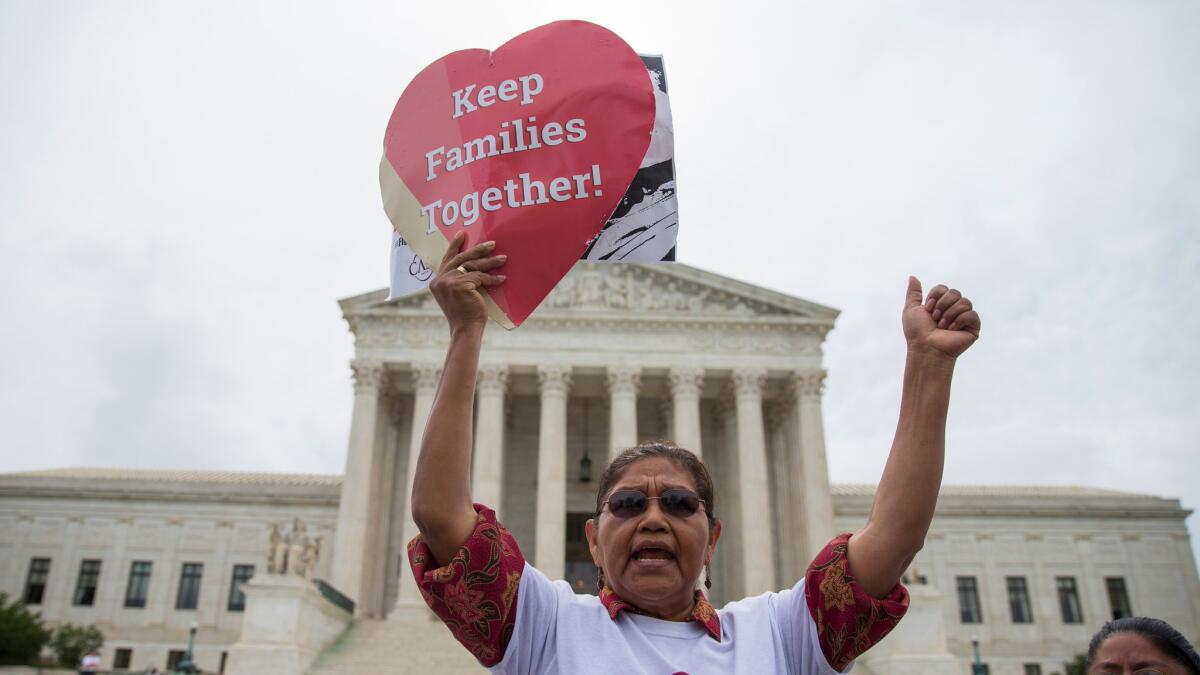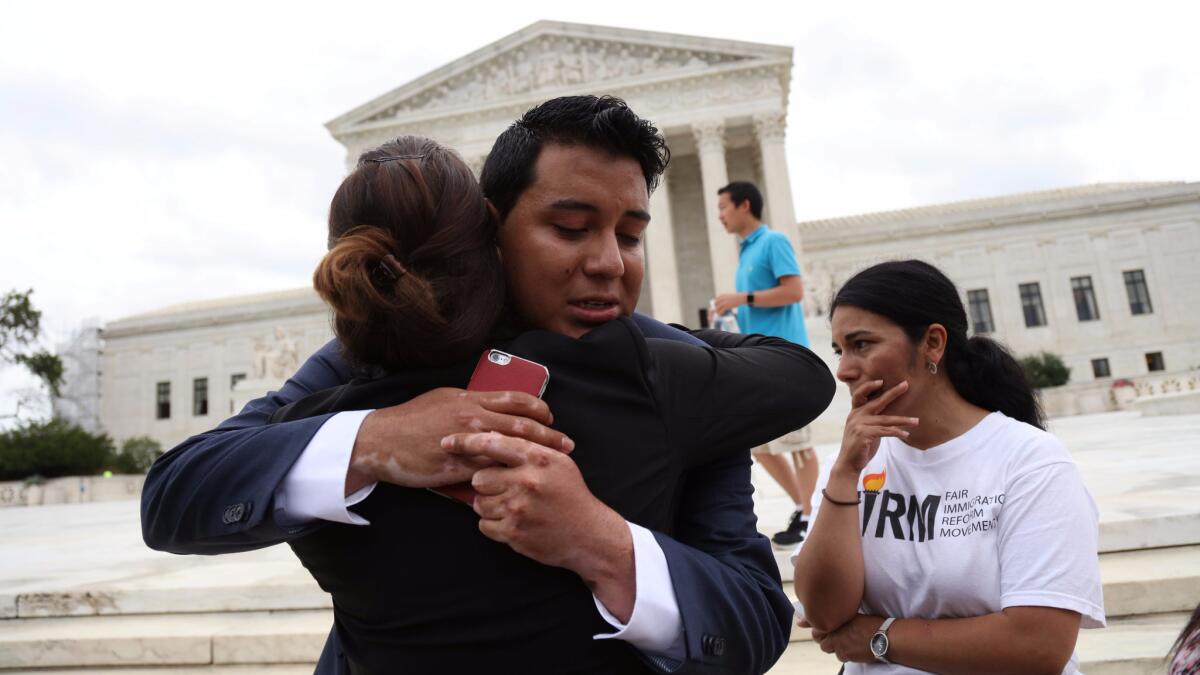Immigrant rights activists vow to keep fighting after Supreme Court deadlock

- Share via
Rosa Maria Soto ached to visit her dying mother in Sonora, Mexico, one final time. But family members worried that the immigrant rights activist who lacks legal status would not make it back across the border to her Phoenix home. A phone call from her brother — the only one of her nine siblings still in Mexico — was strung with tears.
“He said to stay here, keep fighting,” Soto, 62, recalled. So she did.
But Thursday, Soto felt defeated when she learned that the Supreme Court deadlocked on the legality of President Obama’s immigration plan that would have given deportation relief and work permits to 5 million people who came into the country illegally.
The mother of three children and six grandchildren in the United States, Soto would have potentially been protected under the program, known as Deferred Action for Parents of Americans and Lawful Permanent Residents.
Still, she, along with other activists and families facing uncertain futures, have vowed to continue the push for reform. Some took to rallies to insist that the deadlock had stopped nothing.
“Obama, escucha, estamos en la lucha,” protesters outside the Immigration and Customs Enforcement office in Phoenix chanted. Obama, listen, we are in the fight.
“The war has not been lost,” insisted Apolonio Morales, political director of the Coalition for Humane Immigrant Rights of Los Angeles.
Marielena Hincapié, executive director at the Los Angeles-based National Immigration Law Center, said the group will push for the case to be reheard by the high court, and for the Justice Department to seek a stay while the court decides whether to rehear it.
“This is a case of national importance and it deserves a full and fair day in court,” Hincapié said. “We will also be looking at other ways to minimize the harm from the nationwide injunction.”
The children of immigrants without legal status say the recent news has only deepened the anxiety they feel about being deprived of the people who sought to provide them with a richer life.
“We live every day with an overwhelming fear of losing our parents to deportation,” said Zaira Garcia, 23, who has three sisters. The Austin, Texas, resident — an organizer with the immigrant rights group FWD.us — has parents who would have been eligible for Obama’s plan. She cried when she learned of the deadlock.

“This is about moms and dads who have been humiliated, exploited and continue to keep their heads down out of love for their U.S. citizen children,” Garcia said.
Mariana Villafana, 26, who qualified for the Deferred Action for Childhood Arrivals plan in 2012, said she had prayed that her parents — both of whom arrived from Mexico and have worked as janitors for more than two decades — would benefit this time around.
“They didn’t seem very affected by the news because they worry more about the kids, but as a daughter, I’m struggling with this,” Villafana said in Los Angeles.
In Homestead, Fla., Armando Carrada, 26, a DACA recipient whose mother would have qualified for DAPA, was unsure how to go about explaining the deadlock to his undocumented mother when she returned from her job at a local nursery. She had stopped caring about immigration reform a while ago because it didn’t seem to help.
“A lot of our community is going to go back into the shadows,” he said. “People were hoping they could work and travel around and not be in fear of not making it home to their families.”
The high court’s 4-4 tie Thursday on the legality of Obama’s immigration plan left in place a lower court’s order in Texas that blocked it from going into effect.
Anti-illegal immigration activists celebrated the ruling, declaring it a win for American workers and the Constitution.
“The court maintained that immigration policy — including the power to issue work permits — belongs to the people through their elected officials in Congress and that a president cannot unilaterally change that policy,” said Roy Beck, president of NumbersUSA, a powerful national advocacy group opposing illegal immigration.
“U.S. citizens and legal immigrants in this country have been spared having to face direct job and wage competition from millions of illegal migrants for whom President Obama had promised to open up every job in America.”
Some say that despite the setback, progress in immigration reform should be noted.
Supreme Court decision deals blow to health coverage efforts in California »
Eunsoo Jeong had been sent from South Korea at age 13 to live with her grandmother in San Francisco. She later took on odd jobs, working off the books and bounced around to various relatives’ houses. Eventually, she benefited from the earlier federal action on childhood arrivals. The 28-year-old Los Angeles resident is optimistic about it one day extending to the parents of U.S. children.
“I have to be hopeful,” Jeong said. “I’m assuming that there’s a lot of organizations that are still going to be fighting for it. I’m still going to work as part of this.”
For the parents who saw Obama’s plan as a step toward a more stable future, news of the deadlock was sobering.
“All of his dreams disappeared,” Eloya Velasco, 41, said of her husband when he learned about Thursday’s deadlock.
Her husband’s long hours at a restaurant are not compensated the same as they would be if he had a Social Security number, she said.
The couple, who live in the Pico-Union neighborhood, had often discussed returning to Mexico. They stay, she said, for their four children, two of whom will graduate college next year. “If we leave, we’ll take away their opportunities,” Velasco said.
Leticia Morales and her husband face a similar predicament. They have grown accustomed to a recurring question from their four children born in the United States. “Will they ever deport you?”
Morales’ answer is the same. “I tell them, ‘No, we hope not. But if that happens, you’re going to stay here and continue studying.’ Because their life and their future is here.”
Twitter: @thecindycarcamo, @nigelduara, @mollyhf and @brittny_mejia
Los Angeles Times staff writers Alexia Fernandez and Corina Knoll also contributed to this report.
MORE SUPREME COURT NEWS:
Supreme Court upholds use of affirmative action at universities
Obama to voters: After the Supreme Court ruling, immigration reform is up to you now
In the final stretch, how will a divided Supreme Court rule on these big cases?
UPDATES:
3:03 p.m.: This article was updated with additional reporting and editing.
10:29 a.m.: This article was updated with additional reaction.
This article was first published at 10:08 a.m.
More to Read
Sign up for Essential California
The most important California stories and recommendations in your inbox every morning.
You may occasionally receive promotional content from the Los Angeles Times.














